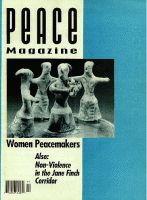
Peace Magazine Jul-Aug 1992, page 8. Some rights reserved.
Search for other articles by PMag staff here
James Nicholas, international secretary of the World Council for Global Cooperation, invited Mairead Maguire, one of the several Nobel Peace Prize winning signatures of his Toronto Appeal, to speak in Toronto this February. Thanks to his efforts, the Toronto City Council unanimously endorsed the Toronto Appeal on May 5. Nicholas now plans to present the appeal to other major Canadian cities such as Vancouver, Calgary and Montreal. At the end of May, he and Mairead were granted a private audience with the Secretary-General of the United Nations. Following is the text of the Toronto Appeal.
If you feel interested in helping spread this appeal, either write to the World Council for Global Cooperation, 2472 Bayview Ave, Toronto, Ontario, or contact James Nicholas directly at his work at Niagara College, 519/735-2211 or at home, 519/732-4600.
As we approach the dawn of a new millennium, we are sounding a new call for the establishment of a just and decent society for all the Earth's people.
In the past much of humanity suffered because to a large extent the Earth's resources were employed either unwisely or unfairly. In the future all humanity must benefit from a fair and rational use of the Earth's scarce resources.
In pursuing this ideal, we earnestly appeal to people of goodwill to support the policy of a "peace dividend.' This policy recommends that substantial portions of the world's colossal military expenditure be diverted into the civilian sector to satisfy vital human needs. This transfer of resources needs to be planned and managed equitably
The benefits of the peace dividend can be enormous. A stream of funds can flow into fields for human betterment that are now parched by financial constraints and budget deficits.
Among developed notions, the peace dividend's considerable resources can enhance the quality of life for all people by improving services without appreciably increasing taxes or borrowing.
Among developing nations, the peace dividend can raise the living standards of billions of people, by providing much needed capital to make societies more self-sufficient and more integrated with the work' economy.
Transcending all nations, there are four major problems in the world today: war and militarism, pervasive poverty, the ecological crisis, and the violation of human rights. As these problems are interlinked, the peace dividend can fund globally interlinked solutions.
The squandering of resources has culminated in war and conflict, which have turned this century into the most violent in human history. Since 1945 trillions of dollars have been spent on the military in search of security, only to increase world insecurity. Mountains of arms have been produced which have not led to peace but to millions of graves.
We call for strong grassroots support for the peace dividend as a path to general disarmament and as an incentive for settling disputes in accordance with international law. The peace dividend can encourage policymakers to realize that national security can best be achieved as a part of the common security of all nations.
The maldistribution of resources is the one primary cause of world poverty. It has become so severe that for millions of people, especially children, their short lives are but marches to their graves. Chronic hunger is the worst product of poverty and poverty is one of the worst forms of human indignity. A secure world cannot be built upon a foundation of human misery.
The peace dividend offers hope. It can lighten the burden of Third World debt, help control the population explosion, aid food production and provide for clean water. It can be invested in self-help projects to liberate a large port of humanity from despair, disease, and destitution.
The misuse of resources has triggered a global ecological crisis, making the Earth less habitable to all of humanity. The crisis has been aggravated by military factors. Wars have bruised the environment and the military sector, by absorbing trillions of dollars, which has denied funds for environmental renewal. The peace dividend can help rejuvenate the biosphere by augmenting resources for reforestation, regeneration, protecting the global commons, and promoting sustainable growth.
The worldwide traffic in arms is a drain on the Earth's resources and it is a contributing factor in corrupting many governments into military dictatorships. Their repressive actions often include a sequence of horrors such as abductions, torture, death squads, genocide.
We are asking for a groundswell of public support for the peace dividend. We hope that this can restrain arms producers from selling their weapons for profit to governments that oppress their own people.
We conclude with the words of Albert Einstein: 'As human beings, we appeal to our fellow human beings, to remember our common humanity." Let us not forget that in this shrinking globe we can no longer live as strangers because in each of us there is a little of all of us.
The World Council for Global cooperation, Toronto, Canada, July 1, 1991.
George Wald, Nobel Laureate, USA, Chairman
Mairead Maguire, Nobel Laureate, UK, Director
Ilya Prigogine, Nobel Laureate, Belgium, Director
Jan Tinbergen, Nobel Laureate, Netherlands, Director
Barnes Nicholas, Canada, International Secretary

Peace Magazine Jul-Aug 1992, page 8. Some rights reserved.
Search for other articles by PMag staff here